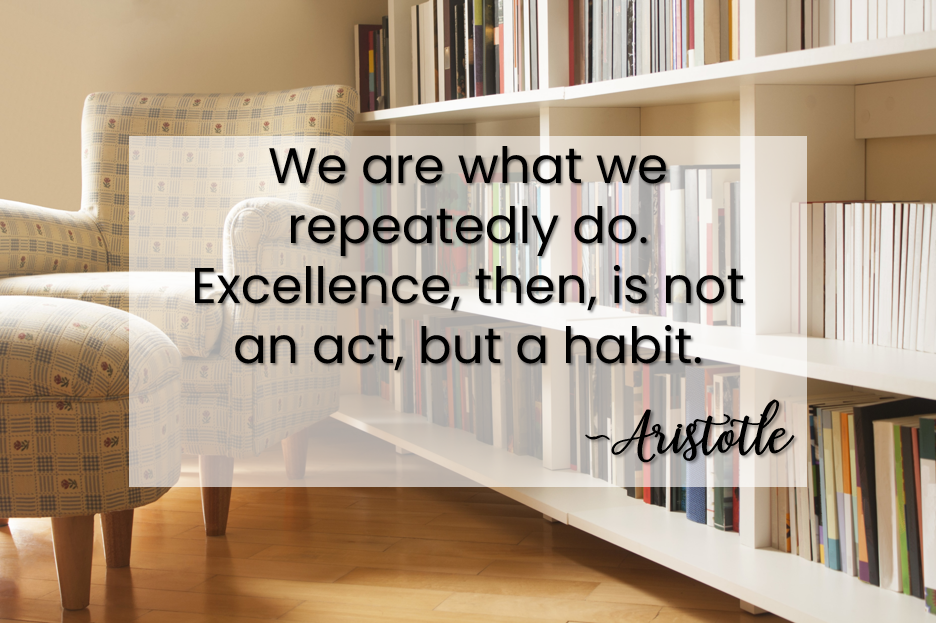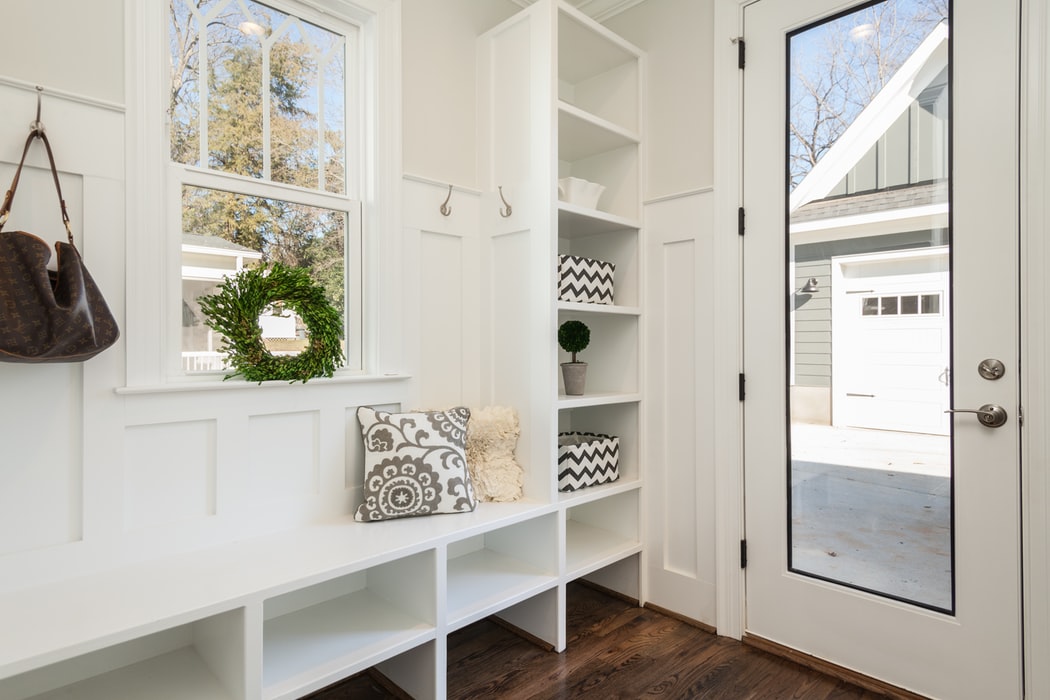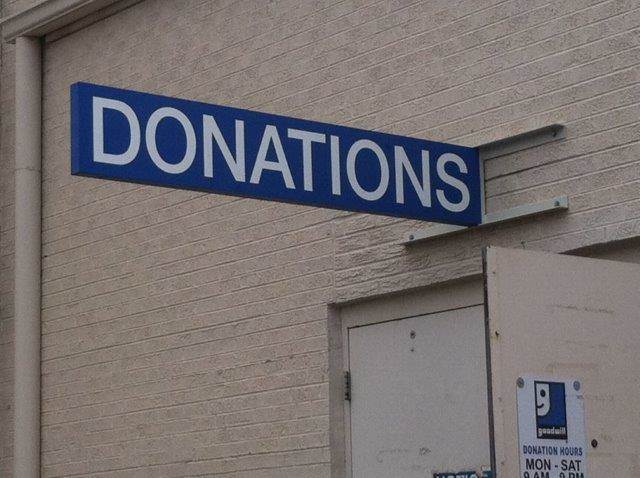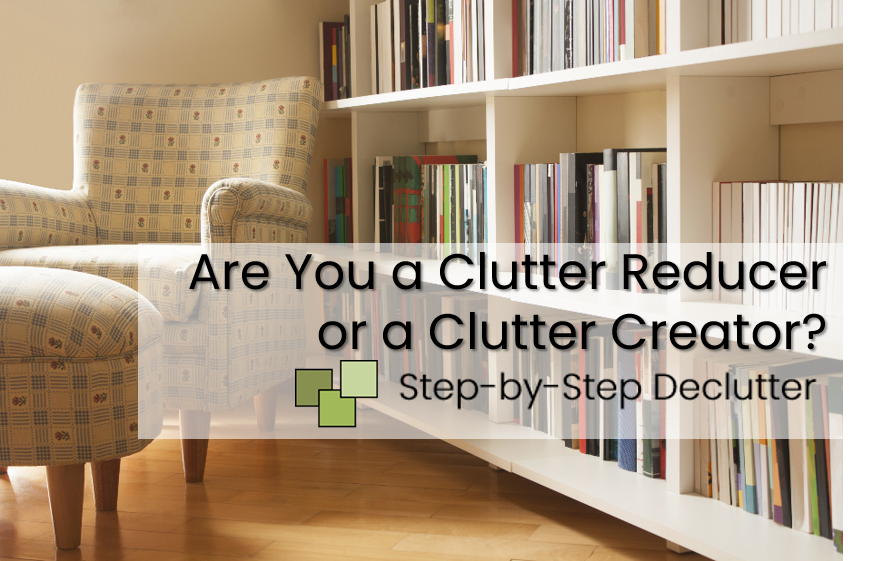|
|
|
I love this quote. It reminds me that actions lead to habits, and that I can control what habits I develop by making mindful decisions about how to act and spend my time day in and day out. In many ways, organization and clutter are habits. Dozens of small decisions throughout the day have a big cumulative impact on the amount of clutter that surrounds us. In the Western world, everyone deals with clutter all the time. Even for the organized and tidy, the threat of impending clutter is ever present. It's a sort of by-product of our lifestyle and culture. The good news is, we can choose whether to fight off the threat or succumb to it. In other words, our actions can either add to or limit the amount of clutter in our lives. So the question each of us must ask ourself is "Am I a clutter creator, or a clutter reducer?" People who live relatively clutter-free lives are able to do so because they have developed habits that prevent things from piling up unnecessarily. Consequently, they practice reducing their clutter on a nearly continual basis. Let's examine the differences in every day behaviors of clutter creators versus clutter reducers. Where Does It Go?Clutter Reducers It will come as no surprise that clutter reducers follow the famous advice of Benjamin Franklin, "A place for everything, and everything in its place." Clutter Creators A major contributor to the creation of clutter is the lack of an assigned space for things. When it is unclear where a thing belongs, that thing typically gets left lying around. Therefore, if you're serious about reducing clutter, you must determine a location for everything in your home. This may require some serious consideration up front, but it pays long term dividends towards living a clutter-reduced lifestyle. If you don't know where a thing belongs, ask yourself why. Is it because there isn't room for the item in the place where you think it should belong? Or is it because the thing has no real meaning or value to you? Or is it something else? The answer to this question is the first step in resolving the overall issue. Incoming ClutterClutter Reducers Clutter reducers don't just manage the clutter in their homes; they also tend to make mindful decisions about what gets through the door. Instead of bringing home fliers and other bits of paper they take photos with their phones, thus allowing them to have the information without the clutter. They avoid free samples, SWAG, and other "free" gifts they know they won't use. They think before they buy and ask themselves questions like "Where will I put this if I bring it home with me?" Clutter Creators Clutter creators like stuff. It gives them a little thrill to get something "free", even if they don't actually want or need the item. They operate under the false assumption that you can't organize information that isn't printed out on a piece of paper. They accept every scrap of paper with potentially useful information on it to serve as a visual, physical reminder of something they want to do or to research or to purchase. They are much less likely to consider whether they have the space for an item before they make a purchase, only whether or not they like or want the item in question. Tidy HabitsClutter Reducers Clutter reducers are in the habit of putting things away. When they walk in the door, they hang up their coat, they tuck their shoes neatly away where they belong, they hang up their bag or place it in its permanent home. If they have made purchases, they put them away - right away. If they are carrying the mail with them, they sort through it and put it in its proper place (trash, recycling, action pile, etc.). When they are finished using a thing, they put the item where it belongs. When they are done eating, they clean up after themselves. Clutter Creators Clutter creators tend to function under the false assumption that things take longer to complete than is actually true. Hanging up their coat seems like more effort than tossing it over the nearest piece of furniture. Kicking their shoes aside haphazardly seems quicker than neatly setting them on a shoe rack. Taking the time to rinse and load a small handful of dishes into the dishwasher isn't worth the effort when there are just going to be more dishes later. When they are tired at the end of the day, it seems more prudent to pile packages, bags, and mail on the nearest surface than to "deal with" everything. In reality, most of these tasks take mere seconds to complete, and all of them can be accomplished within a few minutes at most. What clutter creators don't realize is that taking those few seconds or minutes will actually leave them feeling better about their space, better about themselves, and better about life in general, thus making it easier to relax and unwind. Ease of UseClutter Reducers Clutter reducers naturally understand and practice the concept of 'ease of use' and organize their homes accordingly. Simply stated, it's the practice of making the things you use easy to access (and easy to put away). It's a way of setting yourself up for success when it comes to maintaining clutter. It is not hard to implement ease of use strategies in your home; it just takes a little forethought and preparation to set things in motion. Examples of ease of use practices include:
Clutter Creators Clutter creators sometimes make things harder than they need to be. They place things in illogical locations where they are difficult to access or even find. They buy elaborate storage systems that look nice but function poorly. In short, they have not learned how to create storage that is easy to use. The good news is, this is a skill, and it can be learned! To start with, read about basic concepts of decluttering here. Systems for SuccessClutter Reducers One of the ways that clutter reducers set themselves and their families up for success in the battle against clutter is by creating systems. They may not even realize that this is what they are doing, but these systems are an integral part of their personal clutter control strategy. A system is simply a way of doing things. Clutter control systems are specific methods designed to solve potential clutter issues. An example is the entry way. These often passed through and typically small spaces are at the front line in the battle against clutter. Those who have systems in place for storing incoming and outgoing gear, are much less likely to have a cluttered entry, and much more likely to have what they need when they walk out the door each day. Clutter Creators Clutter creators usually recognize problem areas, but they don't know how to deal with them. They wonder why the entry is always a mess, but they fail to create a system for avoiding this situation. They puzzle over the lack of space on their kitchen counters but continue to use them as a dumping ground for all sorts of non-kitchen items. If you're struggling to resolve specific clutter issues in your home, read about developing systems for decluttering here. A Declutter MindsetClutter Reducers Decluttering is part of the clutter reducers mindset. They regularly evaluate the condition of their space and the value of the items that occupy it. They keep a box or bin in the garage (or other convenient but out-of-the-way location) where they place items they intend to donate, and when it's full, they take it to the thrift store. Clutter reducers have learned that it is more comfortable and enjoyable not to live with things they no longer want, need, or use. Perhaps most important, they have learned to let go of guilt and fear - the two big factors that prevent people from getting rid of items that no longer serve a purpose or add value to their lives. Clutter Creators On the other hand, clutter creators are often driven by guilt or fear to hold onto things they really don't want or need. They worry that they might need an item at some future point or that someone will be offended if they give something away. It's also true that some clutter creators don't really think at all when it comes to stuff. They make no evaluation whatsoever, content (or not) to live with the growing collection of stuff that surrounds them, never giving thought to whether or not individual items have merit and meaning. Which One Are You?As you can see, there are clear distinctions in the way that clutter reducers and clutter creators think and act. If you are a clutter creator at heart, and you'd rather be a clutter reducer, simply begin now to implement some of the practices and thought patterns that help clutter reducers manage and contain the potential clutter in their lives. You can do as Aristotle indicated and make excellence (via organization) a habit.
8 Comments
1/18/2021 11:37:59 am
You make good points about the ways we can add or detract to the clutter in our lives. And I agree that the result we see has a lot to do with our daily habits. I'm just uncomfortable with labeling people as clutter reducers or creators.
Reply
1/18/2021 05:40:25 pm
I really like how you broke everything down. There’s a lot of truth here. I am definitely on the side of a clutter reducer. Clutter nags me. I have a place for everything and everything in this place. My husband, on the other hand, has a different mindset and I honestly think he doesn’t see the clutter. It’s a challenge.
Reply
1/19/2021 03:08:29 pm
I think it's pretty rare for two people to have the same clutter tolerance, but it's also interesting how you can (either consciously or unconsciously) influence one another. My husband wasn't at all tidy when we got married, but he has evolved to prefer things that way, so much so that he is regularly asking me "Is there a reason this is out?" My answer is usually yes because I have a habit of leaving things out that need my attention as a reminder. Too bad a couple of my children haven't picked up the skill yet...
Reply
1/19/2021 02:36:26 pm
You really spelled out each of these categories of where we need to examine our approaches. I think perhaps we all fit into more than one aspect, though. Professionally, as an organizer, I'm a clutter reducer and those are the skills I teach, but personally, my "tidy habit" issue is that I *like* to be lazy let a few things pile up...and then I get joy out of decluttering once it piles up for a day or two. I'd blame it on client withdrawal because of the pandemic, but I've always preferred making a "transformation" in some spaces to perfect (but boring) maintenance.
Reply
1/19/2021 03:11:09 pm
I love this, Julie! You bring up a crucial point, one that I failed to address - which is that most of us are not strictly reducers or creators. We all have areas where we "let things go" a bit and other areas where we are consistent about maintenance. I also think your point about wanting something to declutter is interesting and valid. There is a great sense of accomplishment and satisfaction that comes from the process.
Reply
Leave a Reply. |
Archives
November 2022
Categories
All
|
Proudly powered by Weebly





 RSS Feed
RSS Feed